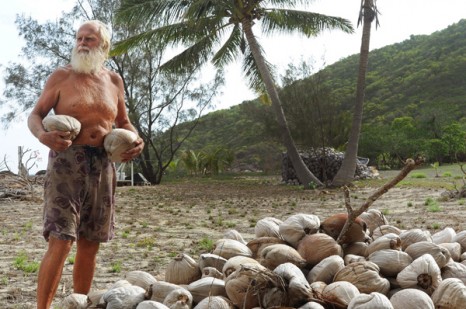After the mutiny on the HMS Bounty in 1789, Captain Bligh and the men loyal to him sought sustenance on a 40-hectare speck of sand off Cape York, which they duly dubbed Restoration Island. A couple of centuries later, following the stock market crash of 1987, Sydney businessman David Glasheen too sought refuge on ‘Resto’. Sitting 40 minutes from the settlement of Lockhart River by boat and some 800 kilometres from Cairns, the picture-postcard volcanic island is two thirds national park, a haven for birdwatchers and the subject of several castaway-themed television shows.
Speaking to Wild on a solar-powered phone from his pre-WWII boatshed home, David recalls the moment he opted to become the sole resident of this idyllic island on the Great Barrier Reef more than 20 years ago.
“I was a chairman of a major company when [the crash] came out of nowhere, I lost $10 million and my whole lifestyle fell apart,” he says. “I was what you’d classify as clinically depressed and made the decision not to get back into the stress of the mainstream when a new lady friend and I started talking about how an island is supposed to be the most non-stressful place to live.” In 1993, with help from a real estate agent friend who arranged subleasing from the Ballarat-based owner of a 13-hectare portion of the island, David and his then-girlfriend moved to Resto. “We looked at Hicks Island as well but settled on Restoration because it’s closer to infrastructure and has all-weather anchorage, plus it has a bit of history to it,” David explains. “People thought I was crazy then and still ask when I’m coming back to ‘the real world’, but I’m fitter than I was 30 years ago. I live a physical life free of chemicals, and looking at some of my friends I don’t think I’d be alive today if I’d stayed [in the city].”
It was not long, however, before David’s partner grew tired of their remote lifestyle and he was left alone. At the same time, the businessmen with whom he had discussed building a small-scale health retreat on the island – as a condition of his habituation – developed grander and more profitable plans. He says: “They got approval for a 60-bed resort, which is ridiculous. I envisage a 12-bed, possibly donation-based, healing retreat for people who are looking for breathing space and seeking the wild, the kinds of people who are now travelling to places like Nepal or Peru looking for another dimension to their life.” As a result of the conflicting resort plans and a title dispute with the traditional owners, the island has been at the centre of various legal battles over the years, with David having given his share to the Kuuku Ya’u people long ago. Though he could officially be evicted any day, David says the support of the local community protects his way of life from “white fella law” and considers himself ‘island caretaker’.
While he receives frequent visits from sea kayakers, fishermen and volunteers from the Willing Workers On Organic Farms scheme over much of the year, David is alone with only his beloved Rhodesian ridgeback-dingo crossbreed Quasi for company for long periods during the wet season…
…read the whole profile in Wild issue 144.


